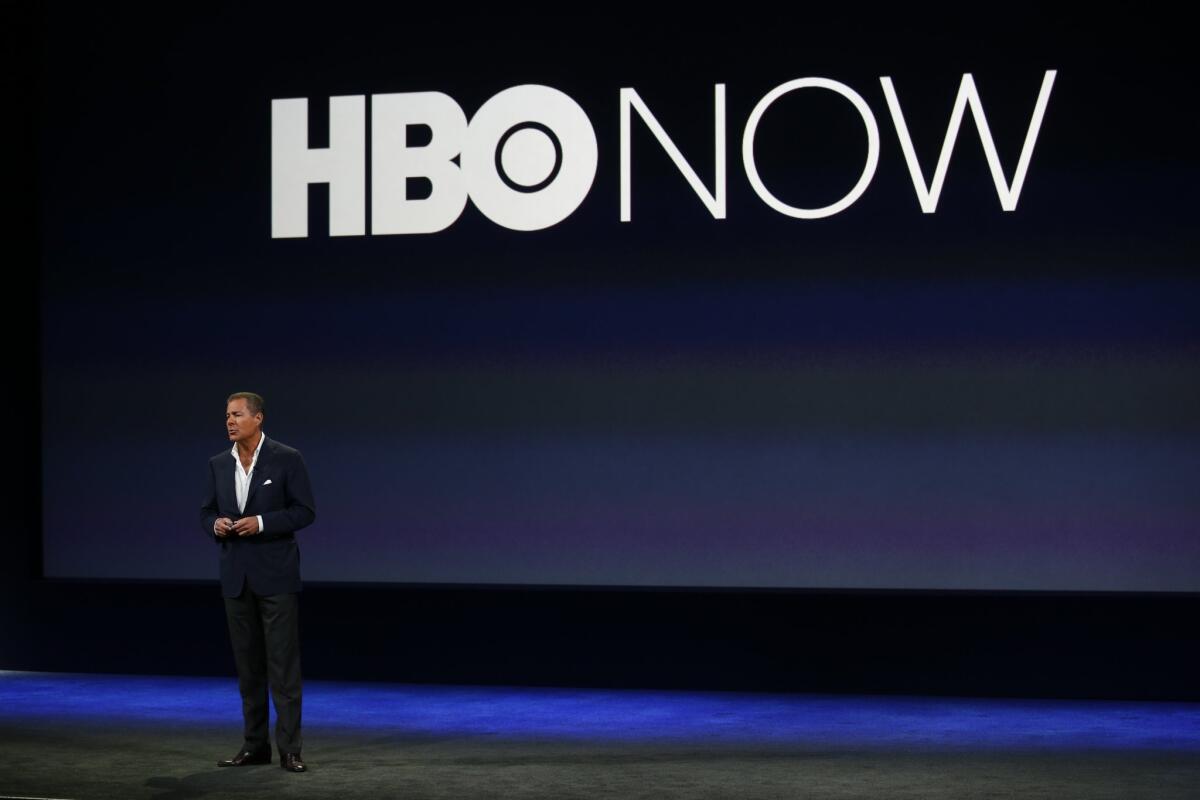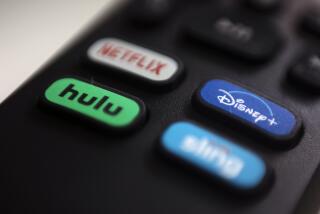HBO Now stand-alone service shakes up TV industry

HBO unveiled its new stand-alone streaming service -- HBO Now -- not from the company’s home base of New York City, the hub of traditional media, but rather on the edge of Silicon Valley.
The venue spoke volumes.
On Monday, HBO Chief Executive Richard Plepler joined Apple Inc. Chief Executive Tim Cook on the stage of an Apple product event in San Francisco.
There, Plepler announced HBO’s new $14.99-a-month service called HBO Now, marking the first time HBO will be made available directly to customers.
Beginning in April, Apple customers will be able to subscribe to the service using the HBO Now app on their iPhones, iPads or iPod Touches, or directly on Apple TVs. The new stand-alone service will go live next month on Apple products in time for the fifth season of HBO’s hit series “Game of Thrones.”
Apple will have a three-month period to exclusively offer HBO Now; then the service is expected to become more widely available through other devices.
Plepler seems determined to maintain his company’s position as the leader in television programming. And he recognizes that the future of the TV industry increasingly is tied to advances in technology -- and thus HBO needs to strengthen its ties to technology giants like Apple.
“This is a transformative moment for HBO,” Plepler said from the Apple stage in San Francisco.
“With this new partnership, a natural evolution for the network, we have access to millions of Apple customers who are used to getting their favorite apps immediately,” Plepler said in a statement.
HBO’s goal is to take a huge slice of the online streaming services market to reach cord-cutters and other consumers who do not subscribe to traditional pay TV packages.
There are approximately 10 million homes in the U.S. with high-speed Internet service but not a pay TV subscription. Younger adults are more inclined to get their entertainment from a variety of streaming services rather than sign up for a $100-a-month pay-TV subscription.
“When you subscribe to HBO Now you will have access to all our acclaimed original programming -- past, present and future -- as well as our unmatched lineup of Hollywood blockbusters,” Plepler said.
Just a few years ago, the longtime HBO executive would often joke that there were “4 billion reasons” to adhere to HBO’s long standing business model rather than take a page from Netflix by offering HBO service directly to consumers.
That was a nod to the $4 billion in revenue that HBO generates each year through its affiliation deals with pay-TV companies, including Time Warner Cable, Comcast Corp., DirecTV and Dish Network.
But the world has changed. Consumers have embraced online streaming services, including Netflix, Hulu and Amazon.com. Viewers like the convenience of video-on-demand -- and also the lower price point of streaming services.
Because HBO has some of the most sought-after programs on television, its decision to offer a stand-alone service is expected to accelerate the dismantling of bundled pay TV channel packages in which households pay for a wide range of programming, even for channels they never watch.
HBO has long been considered part of the glue that holds the pay-TV packages together.
Since HBO signaled its move last fall, several other established networks including CBS and children’s channel Nickelodeon have introduced so-called over-the-top stand-alone services.
Last week, NBC acknowledged that it was working on a stand-alone comedy channel that will likely feature such shows as “The Tonight Show with Jimmy Fallon.” Nearly 70% of the audience for Fallon’s show already watch clips online rather than tune in at 11:35 p.m. when the show runs on NBC.
HBO is pricing the service – at $14.99-a-month – considerably higher than the fees charged by competing streaming services such as Netflix and Hulu Plus. There are two reasons for HBO’s pricing strategy. First, the network hopes to maintain its status of setting a gold standard for television.
The second motivation is that HBO wants to keep intact its long-standing relationships with pay-TV operators.
HBO already costs pay-TV customers about $15 a month in addition to their basic plans. About 33 million subscribers in the U.S. currently receive the service through their cable or satellite TV companies.
By offering its new HBO Now stand-alone service at roughly the same cost, people who already subscribe to pay-TV and HBO won’t have a financial incentive to suddenly cancel their subscriptions.
HBO plans to offer a 30-day introductory free trial period to new HBO Now customers who sign up through Apple in April. The offering is different from the HBO Go digital option that existing HBO subscribers currently can access as part of their pay-TV subscription.
Twitter: @MegJamesLAT
More to Read
From the Oscars to the Emmys.
Get the Envelope newsletter for exclusive awards season coverage, behind-the-scenes stories from the Envelope podcast and columnist Glenn Whipp’s must-read analysis.
You may occasionally receive promotional content from the Los Angeles Times.











